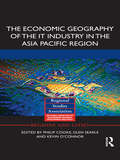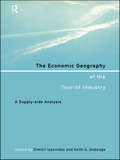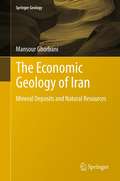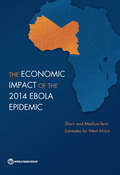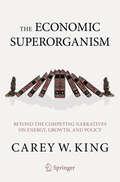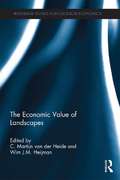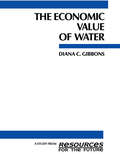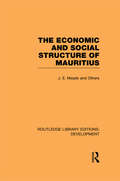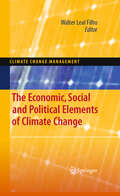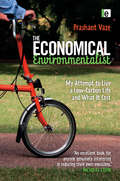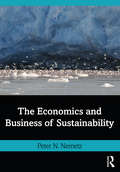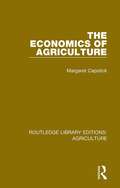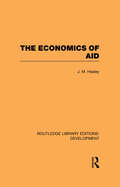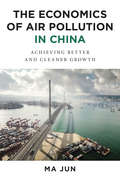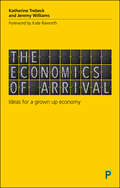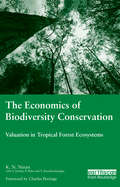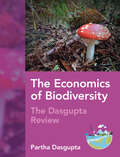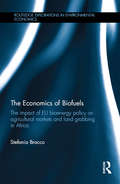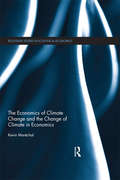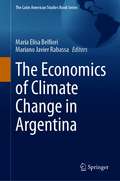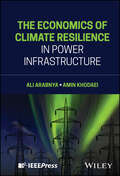- Table View
- List View
The Economic Geography of the IT Industry in the Asia Pacific Region: Economic Geography Of The It Industry In The Asia Pacific Region (Regions and Cities #67)
by Kevin O'Connor Philip Cooke Glen SearleThe development of the information technology (IT) industry in the Asia Pacific region faces two challenges. Firstly, can its established physical, technical, regional and governance infrastructures be adapted to meet the challenges embedded in the set of products and processes created by the IT industry? Secondly, as this adaptation evolves, which cities and regions will be best suited to connect to or lead global responses to these challenges? The chapters in this book have set out to explore these questions, providing details of change in a range of aspects of the IT industry such as mobile phones, software services, and flat screen design in regions in Japan, Korea, Taiwan, India, China and Australia. The book also outlines the policy responses of national and regional governments in Singapore, India and China and India. These case studies provide a basis to understand effective strategies which could be formulated for the future. This book’s originality emerges from the fine detail provided about firms, in particular regions and cities, from research carried out by young scholars in the past two years. This makes it very useful for readers keen to understand the recent changes in this dynamic industry in a fast growth part of the world, and it will also help to shape thinking by policy makers on policy settings that can be applied.
The Economic Geography of the Tourist Industry: A Supply-Side Analysis
by Dimitri Ioannides Keith G. DebbageThe Economic Geography of the Tourist Industry bridges the gap between tourism research and economic geography by bringing together leading academics in geography, planning and tourism. The authors explain tourism's definitions and examine whether tourism can be categorized as an industry. They provide detailed analyses of key sectors, such as tour
The Economic Geography of the UK
by Andrew Jones Dr Neil CoeWith the UK still facing the repercussions of the 2007 economic downturn, Coe and Jones' text is a timely, engaging discussion of the key issues facing the UK economy from a purely geographical perspective, written by some of the leading academics in the field. With pedagogical features to facilitate learning, including further reading and chapter aims, the text explores the complex connections that constitute the UK economy including the city and finance, the uneven development of the UK, the UK economy's links to the European Union and its wider ties to the global economy. Written for geography students studying modules on economic geography and the human geography of the UK, the text is a vibrantly written, easy-to-understand analysis of the current and future challenges that face the contemporary UK economy. Includes a preface by Doreen Massey.
The Economic Geology of Iran
by Mansour GhorbaniThe Economic Geology of Iran is a complete and comprehensive book about mineral deposits, energy and water resources of Iran. Dr. Mansour Ghorbani has travelled to each of the huge variety of locations that feature the resources covered, personally verifying the details of them all. The book starts by describing the geography and physiography of Iran as well as its various climatic regions and the diverse corresponding vegetation. Then the book gives an excellent overview of the geology of the country, followed by the history of mining in Iran up to now. The author describes also the metallogenic and mineralization phases of Iran, its mineral zones and belts, and, more generally, the distribution of mineral deposits in the country. Dr. Ghorbani gives us also an analysis of the position of Iran in terms of global mineral resources, as well as the role that the country's mineral, energy and natural resources play in its overall economy. The book finishes with also provides a complete list of Iranian mineral deposits. This book is a perfect source of information for all students and researchers in the field of geo-science at the university level but also for mining and oil companies that would like to work, invest and get involved in such businesses in Iran.
The Economic Geology of Iran: Mineral Deposits and Natural Resources (Springer Geology)
by Mansour GhorbaniThe Economic Geology of Iran is a complete and comprehensive book about mineral deposits, energy and water resources of Iran. Dr. Mansour Ghorbani has travelled to each of the huge variety of locations that feature the resources covered, personally verifying the details of them all. The book starts by describing the geography and physiography of Iran as well as its various climatic regions and the diverse corresponding vegetation. Then the book gives an excellent overview of the geology of the country, followed by the history of mining in Iran up to now. The author describes also the metallogenic and mineralization phases of Iran, its mineral zones and belts, and, more generally, the distribution of mineral deposits in the country. Dr. Ghorbani gives us also an analysis of the position of Iran in terms of global mineral resources, as well as the role that the country’s mineral, energy and natural resources play in its overall economy. The book finishes with also provides a complete list of Iranian mineral deposits. This book is a perfect source of information for all students and researchers in the field of geo-science at the university level but also for mining and oil companies that would like to work, invest and get involved in such businesses in Iran.
The Economic Impact of the 2014 Ebola Epidemic
by The World BankBeyond its terrible toll in human lives and suffering, the Ebola epidemic has inflicted a measurable economic impact on West Africa in terms of forgone output, higher fiscal deficits, rising prices, lower real household incomes, and greater poverty. This impact results partly from the health-care costs and forgone productivity associated with being infected, but it is driven principally by the efforts of the uninfected population to avoid exposure ('aversion behavior'). The Economic Impact of the 2014 Ebola Epidemic: Short- and Medium-Term Estimates for West Africa provides a mixed methods analysis of the economic impact, combining theory on the channels of economic impact of the epidemic, economic indicators across sectors in the affected countries, and models of how these economies interact with each other and with the broader world. The result is a quantification of the potential overall magnitude of the economic impact for Guinea, Liberia, and Sierra Leone, as well as for West Africa as a whole. Ebola's short-term economic impact (2014) in the three core countries is on the order of US$359 million in forgone output: That is how much poorer these economies will be than they would have been in the absence of Ebola. Two alternative scenarios are used to estimate the medium-term impact (2015): A Low Ebola scenario corresponds to rapid containment within the three most severely affected countries and limited regional contagion, and a High Ebola scenario corresponds to slower containment in the three core countries with broader regional contagion. The estimates of the output lost as a result of the epidemic in the three core countries for 2015 alone sum to US$97 million under the Low Ebola scenario (implying some recovery from 2014) and US$809 million under the High Ebola scenario. Over the medium term, however, epidemiological and economic contagion are likely in the broader sub-region of West Africa. This report uses a multi-country general equilibrium model to estimate the medium-term impact on output for West Africa as a whole. Under the Low Ebola scenario, the loss in GDP for the sub-region is estimated to be US$2.2 billion in 2014 and US$1.6 billion in 2015. Under the High Ebola scenario, the estimates are US$7.4 billion in 2014 and US$25.2 billion in 2015. These are major regional impacts with global implications. This report will be of particular interest to policy makers and others interested in understanding the broader impact of the Ebola epidemic and in assisting with the subsequent economic recovery.
The Economic Superorganism: Beyond the Competing Narratives on Energy, Growth, and Policy
by Carey W. KingEnergy drives the economy, economics informs policy, and policy affects social outcomes. Since the oil crises of the 1970s, pundits have debated the validity of this sequence, but most economists and politicians still ignore it. Thus, they delude the public about the underlying influence of energy costs and constraints on economic policies that address such pressing contemporary issues as income inequality, growth, debt, and climate change. To understand why, Carey King explores the scientific and rhetorical basis of the competing narratives both within and between energy technology and economics. Energy and economic discourse seems to mirror Newton’s 3rd Law of Motion: For every narrative there is an equal and opposite counter-narrative. The competing energy narratives pit "drill, baby, drill!" against renewable technologies such as wind and solar. Both claim to provide secure, reliable, clean, and affordable energy to support economic growth with the most benefit to society, but how? To answer this question, we need to understand the competing economic narratives, techno-optimism and techno-realism. Techno-optimism claims that innovation overcomes any physical resource constraints and enables the social outcomes and economic growth we desire. Techno-realism, in contrast, states that no matter what energy technologies we use, feedbacks from physical growth on a finite planet constrain economic growth and create an uneven distribution of social impacts. In The Economic Superorganism, you will discover stories, data, science, and philosophy to guide you through the arguments from competing narratives on energy, growth, and policy. You will be able to distinguish the technically possible from the socially viable, and understand how our future depends on this distinction.
The Economic Value of Landscapes (Routledge Studies in Ecological Economics)
by C. Martijn van der Heide Wim J.M. HeijmanThis book aims to explore the avenue of landscape economics and provides the building blocks (from different scientific disciplines) for an economic analysis of landscapes. What exactly constitutes and determines the value of a landscape? It focuses on the value of landscapes in its broadest sense, thereby covering a variety of topics including stakeholder involvement in landscape design, landscape governance and landscape perceptions from different countries. Merely saying that landscapes have value or are important is not sufficient – not when resources are scarce and have alternative uses. Measuring and quantifying the economic value of changes in landscapes would help ensure that landscape management decisions are both (economically) rational and sound.
The Economic Value of Water
by Diana C. GibbonsGibbons examines the water supply problem through five case studies. The problems faced by these regions and the methods suggested to overcome them provide excellent models for the entire United States. The case studies---typically, expanding supplies---but economic efficiency principles lead to emphasizing managing the demand. In many cases, this means reducing demand by raising prices.
The Economic and Social Structure of Mauritius (Routledge Library Editions: Development)
by James E MeadeFirst published in 1961, this reissue examines the contemporary economic problems of Mauritius alongside those social problems which have a bearing on economic development. As a small and isolated economy, marked by a very rapid rate of contemporary population growth, by an extreme concentration on a single product, and by a great diversity of racial, religious and linguistic groups within the population, Mauritius is a representative microcosm of the economic problems of a large part of the developing world. The book considers the impact of a lower birth rate, emigration and economic development upon the economy of Mauritius, examining in detail the labour market, the prospects for agricultural and industrial development, the financial system and the education system.
The Economic, Social and Political Elements of Climate Change
by Walter Leal FilhoA unique feature of this book is its strong practice-oriented nature: it contains a wide range of papers dealing with the social, economic and political aspects of climate change, exemplifying the diversity of approaches to climate change management taking place all over the world, in a way never seen before. In addition, the book describes a number of projects and other initiatives happening in Africa, Asia, Europe, Latin American and the Australasian region, providing a profile of the diversity of works taking place today.
The Economical Environmentalist: My Attempt to Live a Low-Carbon Life and What it Cost
by Prashant VazeReducing your carbon emissions in an economic down-turn can be challenging, but saving the planet doesn't have to cost you more. Tough economic times need not relegate concerns for the planet to the back burner. The author is an environmental economist trying to live a low-carbon life in London. He worked for 15 years in the UK's Office of Climate Change, the Prime Minister's Strategy Unit and the Department of the Environment. So far so good. But he has kids. A family to visit in India. A hectic job. In distilling and building on his own experience of trying to live a low carbon life, he helps us navigate the choices that confront us all - families, singletons, pensioners - when making decisions about what to eat, what to buy, how to travel and how to keep warm in the era of climate change and economic turmoil. He works out the sums and lets us know which choices will make the biggest difference, and which are false savings. His book is an irreverent but seriously rigorous reference guide to low-cost, low-carbon living for everyone - in any location - in tough times. It's brimming with up-to-date information on current and future technologies, tips and ideas for every budget on how to spend the least for the biggest carbon reduction gain and insight from the experiences of people trying to live low-carbon lives.
The Economics and Business of Sustainability
by Peter N. NemetzGiven the emergence of sustainability as the defining issue of our time, it is essential for university graduates, and especially business and economics students, to have a fundamental grasp of the key issues in this emerging multidisciplinary field of study. Nemetz provides a comprehensive, detailed overview of the interlinked economic and ecological concepts central to this new discipline. Accompanying the introduction of the underlying theory is a broad array of real-world supporting data from Asia, Europe and North America. This volume also features a chapter on the threat of emerging pandemics and their significance for the achievement of a truly sustainable world. This book accentuates the value and importance of a strong sustainability approach in an age of climate change emergency. It is an ideal companion for instructors and students of sustainability in business, economics and related disciplines such as geography and political science.
The Economics of Agriculture (Routledge Library Editions: Agriculture #11)
by Margaret CapstickFirst published in 1970. The aim of this book is to provide an introduction to the special problems of agriculture in modern economies. The author writes for students of economics who have already acquired the elements of economic theory; no attempt is made, therefore, to explain simple theoretical concepts, but instead these are used in the analysis of some of the main problems of agricultural adjustment. Emphasis is placed on the position of agriculture in the economies of western Europe and of the United States. Sufficient historical background is given to explain the present use of the factors of production in agriculture and the way in which this use and policies of agricultural support vary from one country to another. Agricultural support policies are discussed with reference to their effect on consumers, producers and on rural society.
The Economics of Aid (Routledge Library Editions: Development)
by J. M. HealeyFirst published in 1971, this reissue considers the main aspects of foreign aid to developing countries in terms of economic concepts and principles. The author gives an economic definition of aid and considers the motives for giving aid and the principles on which it may be allocated. He looks at the effect on the economic growth of developing countries of both the aid given and the need to repay the debt, and the effect on trade patterns and resource allocation of tying aid to one particular project, or one source of goods. While economic analysis is only a first step in providing a basis for policy decisions on foreign aid, Dr Healey shows that many issues can be clarified by looking at them from the economists’ point of view.
The Economics of Air Pollution in China: Achieving Better and Cleaner Growth
by Jun MaSuffocating smog regularly envelops Chinese metropolises from Beijing to Shanghai, clouding the future prospect of China's growth sustainability. Air pollutants do not discriminate between the rich and the poor, the politician and the "average Joe." They put everyone's health and economic prosperity at risk, creating future costs that are difficult to calculate. Yet many people, including some in China, are concerned that addressing environmental challenges will jeopardize economic growth. In The Economics of Air Pollution in China, leading Chinese economist Ma Jun makes the case that the trade-off between growth and environment is not inevitable. In his ambitious proposal to tackle severe air pollution and drastically reduce the level of so-called PM 2.5 particles—microscopic pollutants that lodge deeply in lungs—Ma Jun argues that in targeting pollution, China has a real opportunity to undertake significant structural economic reforms that would support long-term growth. Rooted in rigorous analyses and evidence-based projections, Ma Jun's "big bang" proposal aims to mitigate pollution and facilitate a transition to a greener and more sustainable growth model.
The Economics of Air Pollution in China: Achieving Better and Cleaner Growth
by Ma JunSuffocating smog regularly envelops Chinese metropolises from Beijing to Shanghai, clouding the future prospect of China's growth sustainability. Air pollutants do not discriminate between the rich and the poor, the politician and the "average Joe." They put everyone's health and economic prosperity at risk, creating future costs that are difficult to calculate. Yet many people, including some in China, are concerned that addressing environmental challenges will jeopardize economic growth.In The Economics of Air Pollution in China, leading Chinese economist Ma Jun makes the case that the trade-off between growth and environment is not inevitable. In his ambitious proposal to tackle severe air pollution and drastically reduce the level of so-called PM 2.5 particles-microscopic pollutants that lodge deeply in lungs-Ma Jun argues that in targeting pollution, China has a real opportunity to undertake significant structural economic reforms that would support long-term growth. Rooted in rigorous analyses and evidence-based projections, Ma Jun's "big bang" proposal aims to mitigate pollution and facilitate a transition to a greener and more sustainable growth model.
The Economics of Arrival: Ideas for a Grown-Up Economy
by Jeremy Williams Katherine TrebeckWhat do we want from economic growth? What sort of a society are we aiming for? In everyday economics, there is no such thing as enough, or too much, growth. Yet in the world’s most developed countries, growth has already brought unrivalled prosperity: we have ‘arrived’. More than that, through debt, inequality, climate change and fractured politics, the fruits of growth may rot before everyone has a chance to enjoy them. It’s high time to ask where progress is taking us, and are we nearly there yet? In fact, Trebeck and Williams claim in this ground-breaking book, the challenge is now to make ourselves at home with this wealth, to ensure, in the interests of equality, that everyone is included. They explore the possibility of ‘Arrival’, urging us to move from enlarging the economy to improving it, and the benefits this would bring for all.
The Economics of Biodiversity Conservation: Valuation in Tropical Forest Ecosystems
by K.N NinanEconomic valuation of biodiversity and ecosystem services is possibly the most powerful tool for halting the loss of biodiversity while maintaining incomes and livelihoods. Yet rarely have such approaches been applied to tropical forest ?hotspots?, which house the vast majority of the planets plant and animal species. This ground-breaking work is the most comprehensive and detailed examination of the economics of environmental valuation and biodiversity conservation to date. Focusing on the Western Ghats of India, one of the top biodiversity hotspots in the world, this volume looks at a cross-section of local communities living within or near sanctuaries and reserve forests such as coffee growers, indigenous people and farmers-cum-pastoralists to assess the use and non-use values that people derive from tropical forests. It also looks at the extent of their dependence on forests for various goods and services, and examines their perceptions and attitudes towards biodiversity conservation and wildlife protection. The book concludes with an assessment of the institutional alternatives and policies for promoting biodiversity conservation through economic valuation methods. Related titles Economics for Collaborative Environmental Management (2005) 1-84407-095-6
The Economics of Biodiversity: The Dasgupta Review
by Partha DasguptaWe are part of Nature, not separate from it. We rely on Nature to provide us with food, water and shelter; regulate our climate and disease; maintain nutrient cycles and oxygen production; and provide us with spiritual fulfilment and opportunities for recreation and recuperation, which can enhance our health and well-being. Nature's constituents such as ecosystems and the biodiversity that are embodied in them are therefore assets. Yet Nature is more than an economic good: many recognise its intrinsic worth and argue that it has moral worth too. This landmark report explains the current state of play in relation to biodiversity loss and outlines a sustainable path to deal with this problem, one that will require us to change how we think, act and measure success. The report was originally commissioned and published by HM Treasury. This title is also available as Open Access on Cambridge Core.
The Economics of Biofuels: The impact of EU bioenergy policy on agricultural markets and land grabbing in Africa (Routledge Explorations in Environmental Economics)
by Stefania BraccoBiofuels are a renewable source of energy used mainly for transportation. They link together food, energy and natural resources sectors, and involve ecological, social and inequality issues. They are an emblematic example of the interactions between economic, environmental, social and political decisions and, as a recent and complex issue, require updated and detailed information to be understood. This book aims to shed light on several economic, social and environmental issues connected to biofuel production and policies. The Economics of Biofuels adopts detailed descriptions, rigorous data analysis and precise econometric methods to estimate the effects of biofuel on different socio-economic factors, avoiding complicated and sometimes ineffective models based on context-specific parameters. In particular, the book focuses on the impact of bioenergy policy on biocommodity production and trade, and on the related phenomenon of land acquisitions to grow biofuel commodities. The book’s main findings are derived by an original and unique dataset collecting information on the investors acquiring land in Africa and on the voluntary standard, certification and labelling schemes adopted by them as Corporate Social Responsibility (CSR) strategy. The analysis links together in an original way public and private initiatives to make biofuel sustainable. Therefore, this book represents an improvement in the understanding of biofuel production and policy’s sustainability. This book is of interest to those who study environmental economics, agricultural economics and sustainable development. It is also suitable for those in the renewable energy sector, with a particular focus on biofuel sustainability.
The Economics of Climate Change
by Nicholas SternThere is now clear scientific evidence that emissions from economic activity, particularly the burning of fossil fuels for energy, are causing changes to the Earth's climate. A sound understanding of the economics of climate change is needed in order to underpin an effective global response to this challenge. The Stern Review is an independent, rigourous and comprehensive analysis of the economic aspects of this crucial issue. It has been conducted by Sir Nicholas Stern, Head of the UK Government Economic Service, and a former Chief Economist of the World Bank. The Economics of Climate Change will be invaluable for all students of the economics and policy implications of climate change, and economists, scientists and policy makers involved in all aspects of climate change.
The Economics of Climate Change and the Change of Climate in Economics
by Kevin MaréchalClimate change is without question the single most important issue the world faces over the next hundred years. The most recent scientific data have led to the conclusion that the globally averaged net effect of human activities since 1750 has been one of warming and that continued greenhouse gas emissions at or above current rates would cause this process to continue to the severe detriment of our environment. This unequivocal link between climate change and human activity requires an urgent, world-wide shift towards a low carbon economy and coordinated policies and measures to manage this transition. The starting point and core idea of this book is the long-held observation that thethreat of climate change calls for a change of climate in economics. Inherent characteristics of the climate problem including complexity, irreversibility and deep uncertainty challenge core economic assumptions and mainstream economic theory appears inappropriately equipped to deal with this crucial issue. Kevin Maréchal shows how themes and approaches from evolutionary and ecological economics can be united to provide a theoretical framework that is better suited to tackle the problem.
The Economics of Climate Change in Argentina (The Latin American Studies Book Series)
by Maria Elisa Belfiori Mariano Javier RabassaIn this volume, the contributors discuss some of the most remarkable global warming effects in Argentina and examine policies that Latin American countries could follow to achieve their individual climate goals. Climate change is one of the most pressing issues today. However, after many years of climate negotiations, the world has failed to introduce a common global policy. Differences in countries' climate agendas have led to unsuccessful efforts. Countries willing to pursue a climate policy have sought alternative strategies to mitigate and adapt to global warming's consequences within their jurisdiction. In this context, Latin American countries' role in shaping the regional climate agenda is yet to be explored. The book covers some papers from the well-received "First Workshop on Environmental Economics and Energy" in Argentina. Using data from Argentina, the contributors analyze the effects of global warming on agricultural yields and the impact of extreme weather on human health. From a global perspective, the contributors also describe the interactions between a reduction in carbon emissions, carbon emissions intensity, and economic growth; the role that trade policies can play to reduce carbon emissions; and the paradoxes that arise from promoting renewable energies in the region. The contributors also address the relationship between sustainability and economic growth; the private sector's role in shaping policies and providing sustainable solutions; and the Latin American challenges for the next generation. The book will be of interest to policy-makers, academics, researchers, and professionals worldwide working in climate change impacts and policy. It will also appeal to a general audience interested in climate change economics, its consequences, and the steps that countries in Latin America can take to move forward.
The Economics of Climate Resilience in Power Infrastructure
by Amin Khodaei Ali ArabnyaFull-scope economic perspectives on planning, operations management, and maintenance of climate resilience building measures in power infrastructure The Economics of Climate Resilience in Power Infrastructure sheds light on the engineering economics of climate adaptation in electric power infrastructure by covering the relevant decision-making processes involved in managing risk and resilience in these systems. The book offers a system-level perspective along with detailed modeling of the most pressing resilience issues, while also providing detailed numerical examples on small test systems throughout the text to help readers see the outcomes of models. The book starts with an introduction to risk management and the techno-economic considerations for resilience building measures in power systems. Next, economic concepts and mechanisms for managing climate risk in power systems are introduced. Afterward, an economic model for resilience investment in these systems against climate shocks is presented. The authors then discuss an economic asset management model for long-term resilience building in critical infrastructure assets. Subsequently, an economic model for operations management during disasters is proposed, followed by a model for post-disaster restoration. Written by a pair of distinguished thought leaders, the book explores other topics such as: Microgrid applications for decentralization, along with an economic model for resilience-oriented microgrid operations A deep defense framework for climate risk management in power systems, along with other factors influencing their operational and financial resilience Essential climate risk financing mechanisms and techno-economic factors in managing risk and resilience in the face of wildfires, heat waves, and hurricanes Steps for utility and infrastructure owners to recover from climate shocks and natural disasters, for the benefit of shareholders, ratepayers, and policymakers The Economics of Climate Resilience in Power Infrastructure is an essential resource on the subject for industry practitioners, R&D engineers, infrastructure planners, and graduate students seeking to incorporate the economics of resilience with engineering solutions to streamline the success of climate adaptation measures in the power and energy industry.
